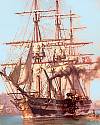
On 22 May 1819, the Savannah left port from Savannah, Georgia, to make the first steam ship crossing of the Atlantic Ocean. More correctly, it would be a steam power assisted vessel, as a steam engine was used only part of the voyage, driving paddle wheels on a vessel fully rigged with sails used much of the time.
What makes today’s Feature appealing is that this extract from an article in The Connecticut Magazine (1905) has many entries from the Captain’s Log. In his own words he records some of the occurrences on board the Savannah during its crossing.
Most almanacs will give a single sentence (like the opening one above), and nothing more. You can read here that there was more of human interest happening on the ship than a simple cruise from point A to point B!

On 22 May 1927, George Olah was born, a Hungarian-American chemist who won the 1994 Nobel Prize for Chemistry. Today's book pick is: A Life of Magic Chemistry: Autobiographical Reflections of a Nobel Prize Winner, by George A. Olah, who gives an intimate look at the many journeys that he traveled—from his early research and teaching in Hungary, to his move to North America where, during his years in industry, he continued his study of the elusive cations of carbon, to his return to academia in Cleveland, and, finally, his move to Los Angeles, where he built the Loker Hydrocarbon Research Institute to find new solutions to the grave problem of the world’s diminishing natural oil and gas resources and to mitigate global warming by recycling carbon dioxide into hydrocarbon fuels and products.
It is available from Amazon, typically about New from $83.55. Used from $3.50. (As of earlier time of writing - subject to change.)
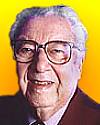 | Why did I decide to undertake my doctorate research in the exotic field of boron hydrides? As it happened, my girl friend, Sarah Baylen, soon to become my wife, presented me with a graduation gift, Alfred Stock's book, The Hydrides of Boron and Silicon. I read this book and became interested in the subject. How did it happen that she selected this particular book? This was the time of the Depression. None of us had much money. It appears she selected as her gift the most economical chemistry book ($2.06) available in the University of Chicago bookstore. Such are the developments that can shape a career. |
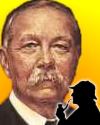 | I could not help laughing at the ease with which he explained his process of deduction. “When I hear you give your reasons,” I remarked, “the thing always appears to me to be so ridiculously simple that I could easily do it myself, though at each successive instance of your reasoning I am baffled, until you explain your process. And yet I believe that my eyes are as good as yours.” “Quite so,” he answered, lighting a cigarette, and throwing himself down into an arm-chair. “You see, but you do not observe. The distinction is clear. For example, you have frequently seen the steps which lead up from the hall to this room.” “Frequently.” “How often?” “'Well, some hundreds of times.” “Then how many are there?” “How many! I don't know.” “Quite so! You have not observed. And yet you have seen. That is just my point. Now, I know that there are seventeen steps, because I have both seen and observed.” |
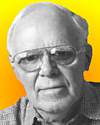 | Phrenology is the only major pseudoscience I know about that once flourished around the world and has since faded away. |
| Before you look at today's web page, see if you can answer some of these questions about the events that happened on this day. Some of the names are very familiar. Others will likely stump you. Tickle your curiosity with these questions, then check your answers on today's web page. | |
| Births | |
 | On 22 May 1920 an Austrian-born British astronomer was born who is known for his steady-state theory of the universe. This theory proposes that, although the universe is expanding, a continuous creation of matter in intergalactic space is gradually forming new galaxies, so that the average number of galaxies in any part of the universe remains approximately the same through time. What is the name of this scientist? |
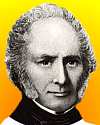 | William Sturgeon, born 22 May 1783, was an English electrical engineer who devised the first electromagnet capable of supporting more than its own weight (1825). The 7-ounce (200-gram) magnet was able to support a greater weight of iron using the current from a single cell. What weight could his first electromagnet support? |
| Deaths | |
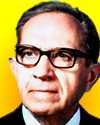 | Albert Claude (1898-1983) was a Nobel-prize winning Belgian-American scientist who developed the principal methods of separating and analyzing components of the living cell. What is the name for the branch of science which studies cells? |
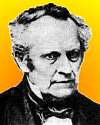 | Julius Plücker (1801-1868) was a German mathematician and physicist who discovered that electron rays produced in a vacuum are diverted from their path by a magnetic field. This effect is a principle vital to the development of modern electronic devices. What is the name of the most familiar of such electronic device? |
| Events | |
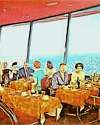 | On 22 May 1961, the first revolving restaurant in the U.S. was dedicated. It was 500 feet above the ground, carrying 260 seats through 360 degrees in one hour. Where is this restaurant located? |
 | On 22 May 1931, the first sale of an unusual new canned meat was made by George Kenneth End of Arcadia, Florida. Cans were first packed in Mar 1931, and first served at an American Legionnaires dinner. End formed the Floridian Products Corp to market the canned meat. George Kenneth End canned the meat of which animal sold on this date? |
 | On 22 May of a certain year, Dr. Washington Sheffield, a dentist of New London, Conn., USA, invented the collapsible metal toothpaste tube, which was later manufactured by his Sheffield Tube Corp. Within the same year, in Great Britain, where toothpaste was formerly sold in round pots, Beecham’s Tooth Paste was packaged for sale in collapsible tubes. In which decade was this invention made? |
Fast answers for the previous newsletter for May 21: Andrei Dmitriyevich Sakharov • Coriolis • velocity of sound in gases and solids • belts of Jupiter and spots on Mars • Lucite, also known as Perspex, Plexiglas, Acrylite, among other names • President Carter, in 1980 • the quarter century including the year 1853.
 If you enjoy this newsletter, the website, or wish to offer encouragement or ideas, please send feedback by using your mail reader Reply button.
If you enjoy this newsletter, the website, or wish to offer encouragement or ideas, please send feedback by using your mail reader Reply button. Your click on a Facebook, StumbleUpon, or other social button on the site webpages is also a welcome sign of appreciation. Thank you for using them.
© This newsletter is copyright 2020 by todayinsci.com. Please respect the Webmaster's wishes and do not put copies online of the Newsletter — or any Today in Science History webpage. (If you already have done so, please remove them. Thank you.) Offline use in education is encouraged such as a printout on a bulletin board, or projected for classroom viewing. Online, descriptive links to our pages are welcomed, as these will provide a reader with the most recent revisions, additions and/or corrections of a webpage. For any other copyright questions, please contact the Webmaster by using your mail reader Reply button.
--
If you do not want to receive any more newsletters, Unsubscribe
To update your preferences and to unsubscribe visit this link
Executive Real Estate Business Class
-
"It was like a man with wings. It wasn't like anything you'd see on TV or in a monster movie." ...
About the publisher
Search This Blog
Blog Archive
-
▼
2020
(1542)
-
▼
May
(194)
- FAMILY: Building kindness in a tough time
- What is history's biggest mystery?
- On This Day for May 31 - Adolf Eichmann hanged, Cl...
- Globalist Race War? because COVID Coup exposed? ...
- Newsletter for Sunday 31 May.
- May 31: Battle of Jutland, Earthquakes and the Clo...
- BREAKING NEWS: SpaceX launches new era of spacefli...
- The Compass: Spain
- On This Day for May 30 - Joan of Arc burned at the...
- Newsletter for Saturday 30 May.
- CORONAVIRUS SPECIAL EDITION: The best way to clean...
- May 30: Voltaire the Rebel
- This Week's Roundup Top Ten from History News Network
- On This Day for May 29 - Mount Everest summit reac...
- Newsletter for Friday 29 May.
- You & your loved ones can be Involuntarily Quarant...
- YOUR WEEKLY ESCAPE: The famous Viking warrior who ...
- May 29: Return of Charles II, Mt. Everest Knocked ...
- Alone Returns With a $1,000,000 Prize
- On This Day for May 28 - Amnesty International fou...
- The secular utilitarian U.N. New World Order has a...
- Newsletter for Thursday 28 May.
- May 28: Spanish Armada Sets Sail, The Indian Remov...
- SCIENCE: Restoring an American frontier
- Breaking News from History News Network
- On This Day for May 27 - Founding of St. Petersbur...
- Christian History Magazine: Covid-19 Response
- Newsletter for Wednesday 27 May.
- Learn whose pulling the strings what the media ha...
- May 27: Habeaus Corpus, Priam's Treasure and Dunkirk
- TRAVEL: Find the secrets to your backyard
- Journey with Ancient Explorers when you subscribe ...
- On This Day for May 26 - Martin Luther declared a ...
- Newsletter for Tuesday 26 May.
- May 26: Start of the Dow Jones Index, Middle Easte...
- HISTORY: The tumultuous past of the U.S. Postal Se...
- A Memorial Day Offer from Britannica!
- Grant Premieres Tonight!
- New This Week On History News Network
- On This Day for May 25 - U.S. Constitutional Conve...
- Economic Re-Opening is a Fakeout + CDC numbers rev...
- Newsletter for Monday 25 May.
- May 25: On This Day in History
- FAMILY: Moving past a big disappointment
- The real history behind WW2 film 'Greyhound' | Ann...
- On This Day for May 24 - Opening of the Brooklyn B...
- Newsletter for Sunday 24 May.
- Vaccine: 20 percent Serious Injury after skipping ...
- May 24: Methodism, Morse Code and the Bridge that ...
- The Compass: Argentina
- Your New Favorite Podcast
- On This Day for May 23 - Tibet annexed by China, C...
- Watch all the talks from BBC History Magazine's Me...
- Newsletter for Saturday 23 May.
- Dolores Cahill PhD expert in molecular genetics an...
- CORONAVIRUS SPECIAL EDITION: There's a reason so m...
- May 23: The Crazy Trigger for the Thirty Years War
- PHOTOGRAPHY: Capturing 59 years of human spaceflight
- How Booze, Drugs, And A Woman Named June Destroyed...
- A Memorial Day Sale for Everyone!
- The Roundup Top Ten from History News Network
- On This Day for May 22 - Roman Emperor Constantine...
- Newsletter for Friday 22 May.
- YOUR WEEKLY ESCAPE: What do the world's happiest p...
- May 22: The World's 1st Atlas is Published and WWI...
- ANIMALS: Saving the pangolin
- On This Day for May 21 - First nonstop solo transa...
- May 21: The 1st Transatlantic Flights and some Mem...
- Ron Panzer interview will air on Friday on Trunew...
- Grant: Watch the Extended Opening Scene
- SCIENCE: Food supply challenges prompt creativity
- Breaking News from History News Network
- On This Day for May 20 - U.S. Homestead Act signed...
- Newsletter for Wednesday 20 May.
- Ron Panzer interview: Trunews.com Today at 3 pm E...
- May 20: Vasco da Gama, Shakespeare and My Fair Lady
- TRAVEL: The promise of happiness, even now
- Inspire Their Curiosity w/ Nat Geo Kids Magazine
- On This Day for May 19 - Ringling Bros. Circus for...
- When we learn what the vaccine will do to everyone...
- Newsletter for Tuesday 19 May.
- May 19: On This Day in History
- See The Most Accurate Map In The World
- HISTORY: At 110 years old, he made our cover
- New This Week on History News Network
- On This Day for May 18 - Eruption of Mount St. Hel...
- Newsletter for Monday 18 May.
- May 18: On This Day in History
- FAMILY: Helping your kids after their troubling dr...
- What did Queen Victoria really look like? | Mediev...
- On This Day for May 17 - School segregation outlaw...
- Newsletter for Sunday 17 May.
- Cardiologist states Hydroxychloroquine side-effect...
- May 17: NYSE Forms and the Watergate Hearings Begin
- The Compass: California
- On This Day for May 16 - Warsaw Ghetto Uprising su...
- Newsletter for Saturday 16 May.
- May 16: Dambusters and Stem Cells
- CORONAVIRUS SPECIAL EDITION: This map shows where ...
- The dream to photograph 10,000 vulnerable animal s...
-
▼
May
(194)
-
Blogroll
-
About
HistoryFact










0 comments:
Post a Comment